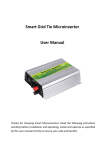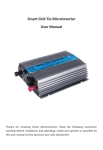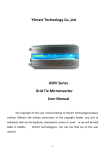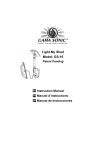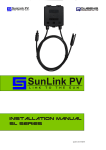Download Smart Grid Tie Microinverter User Manual
Transcript
Smart Grid Tie Microinverter User Manual Thanks for choosing Smart Microinverters. Read the following instruction carefully before installation and operating, install and operate as specified by this user manual strictly to ensure your safe and benefit. Catalogue Smart Microinverter Introduction.................................................….…1 Smart Microinverter System Diagram………………………………………………..2 Important Safety Information……………………………………………………….….4 Technical Parameters………………………………………………………….…………...6 Installation……………………………………………………………………………….……7-8 LED Indicators……………………………………………………………………..…………..13 General troubleshooting……………………….……………………………………......14 Wiring Diagram………………………..………………………………………….………15-17 Warranty……………………………………………………….………………………………...18 Warranty Card……..……………………………………………….……………………….…19 Explore Applications Diagram.……………………………………….…………………21 Any relevant alteration is subject to the latest version without any prior notice. Smart Microinverter Introduction Smart grid tie inverter is a compact unit, which directly converts direct current into alternating current for powering appliances and/or office equipments and connecting to utility grid. The AC output from Smart Microinverter is synchronized and in-phase with the utility grid. It is a key device of power generation systems such as PV power generation system, wind turbine power generation system. Smart Microinverter specially optimized design to work with modularization of DC power supplies which includes the mainstream solar modules, 18V (36 cells), 24V (60 cells) and 36V (72 cells) monocrystal and/or Polycrystalline solar panels, wind turbines and batteries. Smart Microinverters are stabilization, reliable and high conversion efficiency items. It is the best choice for PV power generation systems. Smart Microinverter can be easily placed and attached to the rack underneath of PV module. No need spaces for independent installation and low voltage DC wire connects from the PV module to Smart Microinverter can eliminate the risk of high DC voltage. Distributed modularization design philosophy for Smart Microinverter insures the productiveness of the whole system and will not affect by a single point of failure. Each Smart Microinverter is individually connected to each PV module in the array. This unique configuration means that an individual Maximum Peak Power Point Tracker (MPPT) controls each PV modules and insures that the maximum power available from each PV module is exported to the utility grid regardless of the performance of the other PV modules in the array which may be affected by shading, soiling, orientation or mismatch, etc. Smart Microinverter insures top performance for maximizing energy production from the whole PV system and gets return on investment in less time. 1/21 Smart Microinverter System Diagram The four key elements of a Smart Microinverter System are: PV Module The Smart Microinverter The Data Sender The Data Collector Grid-connected PV system Grid-tied PV systems consist of PV panels, grid-tied inverters, junction boxes, etc. The Smart Microinverters convert the DC from your solar panels and convert it into alternating current (AC) energy used in homes and businesses. Remote Monitoring The Data Sender collects performance information for each inverter in a user's system and transmits this data to the Data Collector and displays it on website, where users can view and manage the inverters’ performance of their solar power system, or view through Data Collector directly. NOTE: The DATA SENDER and the DATA COLLECTOR are optional elements. Before installing these elements, read all instructions and cautionary markings in their corresponding user manuals. 2/21 Features of Smart Microinverter 1. Unique circuit design, choice of import industrial electronic components, higher efficiency, more stable performance. 2. Creative MPPT technology, efficiency more than 99%, faster and more sensitive reaction, more reliable. 3. Parallel type design for DC input and modularization design for inverter, small volume, distributed installation, easy for system configuration, flexible for combination, strong expansibility of system. 4. Adopting high-frequency isolation transformer type, high efficiency, and high security. 5. Perfect electrical protection function. 6. Aluminum alloy housing, not rust, heat-resisting and cold-resistant as well as anti-corrosion. 7. Getting electronic circuit design, appearance design and other core technology patents. 8. High-quality thermal conductivity silica gel potting in, electronic components completely isolated from the air and it makes the aging of electronic components almost stop, greatly enhancing the life time of the product. 9. Highly DSP (Digital Signal Processor) as well as precision sensor IC adopted for getting accurately electrical parameters. Work with data sender and data collector to achieving remote monitoring, so the solar power generation information you can get and monitor at anytime and anywhere. (Purchase additional communication configuration parts separately) 3/21 Important Safety Information Read this First This manual contains important instructions for use during installation and maintenance of the Smart Microinverter. To reduce the risk of electrical shock, and to ensure the safe installation and operation of the Smart Microinverter, the following safety symbols appear throughout this document to indicate dangerous conditions and important safety instructions. DANGER! This indicates a hazardous situation, which if not avoided, will result in death or serious injury. WARNING! This indicates a situation where failure to follow instructions may be a safety hazard or cause equipment malfunction. Use extreme caution and follow instructions carefully. NOTE: This indicates information particularly important for optimal system operation. Follow instruction closely. Safety Instruction Do not use Smart Microinverter in a manner not specified by the manufacturer. Doing so may cause death or injury to persons, or damage to equipment. Perform all electrical installations in accordance with all applicable local electrical codes. Be aware that only qualified personnel should disassemble and repair the Smart Microinverters and non-qualified personnel should not install and/or repair. Do not attempt to repair the Smart Microinverter; it contains no user-serviceable parts. If it fails, contact customer service to claim a return merchandise authorization and start the replacement process. Tampering with or opening the Smart Microinverter will void the warranty. 4/21 If the AC cable connector on the Microinverter is damaged or broken, do not install the unit. Before installing or using the Smart Microinverter, read all instructions and cautionary markings in the technical description and on the Smart Microinverter System and the PV equipment. Connect the Smart Microinverter to the utility grid only after you have completed all installation procedures and after receiving prior approval from the local electrical utility company. Be aware that the body of the Smart Microinverter is the heat sink. Under normal operating conditions, the temperature is 15°C above ambient, but under extreme conditions the Microinverter can reach a temperature of 75°C. To reduce risk of burns, use caution when working with Microinverters. Do NOT disconnect the PV module from the Smart Microinverter without first removing AC power. The better disconnect DC terminal first. It may cause of components damaged if removing AC power first when Smart Microinverter still operation. It is available to disconnect AC power first when Smart Microinverter is not working but the better to disconnect the DC terminal first. Keep away from children, no touching, no playing so as not to electric shock when using. Please installed in place of low humidity and well-ventilated so as to avoid inverter overheating, as well as clear around the inflammable and explosive materials. 5/21 Technical Parameters (Suit for 60 cells solar panel which Vmp is 26-30V as well as Voc is 34-38V.) Power 250W Solar panels 250-280W DC input range 20-40VDC MPPT Voltage 24-33VDC DC MAX current 15A AC output range 120VAC(90-140VAC) or 230VAC(190-260VAC) Frequency range 50Hz/60Hz(Auto control) Power Factor >98.5% THD <5% Phase Shift <1% Efficiency 120VAC(90-140VAC) Peak Efficiency >90% Stable Efficiency >89% Efficiency 230VAC(190-260VAC) Peak Efficiency >92% Stable Efficiency >90% Protection Islanding; Short-circuit; Converse Connection; Low Voltage; Over Voltage; Over Temperature Protection Work Temperature -25℃-60℃ Grade of Waterproof IP67 Show Bi-color LED indicator Cooling Natural convection: no fans Stand-by Power 1-2W EMC EN61000-6-3:2007 EN61000-6-1:2007 Grid Disturbance EN 50178+EN 62109-1+VDE0126-1-12 Grid Detection DIN VDE 1026 UL1741 Certificate CE Mounting Dimension 80CM(length) Remark: The maximum PV Panel open circuit voltage CANNOT be more than 40V. 6/21 Packing Specification Packing Accessory Mechanical Size Net Weight/PCS Inner Box (L x W x H) Carton(L x W x H) Microinverter, AC Cord, User Manual(Warranty Card) 16.5 x 7.5 x 5.5CM 1.6KGS/PCS 26.5 x 20 x 11 CM 42.5 x 28 x 36 CM, 6pcs/CTN, 10/13KGS Installation 1. Diagrammatize DC input and AC output terminals, 2. Attach the Smart Microinverter to the racking or fix onto the wall, 7/21 3. Properly connect the positive and negative of solar panel and Smart Microinverter, 4. AC power cable connects with Smart Microinverter and residential power grid which refers to low voltage civilian single-phase power grid. 5. Switch on power grid after check for input and output connections are correct and Bi-color LED indicator start to flash in red and green in turn for five times, next follow on Bi-color LED indicator flash in green quickly which indicates that Smart Microinverter is in processing of MPPT operation for tracking down the Maximum power point from solar module. Finally, Bi-color LED indicator flash slowly and indicates that maximum power point lock-in. Smart Micro inverter proper functioning and output steady. 8/21 AC waterproof Connectors There are two connectors design for inverters, terminal connector included AC power line and communication data line. Two connectors are the same and can change at random. The electricity power cable which connecting to grid, no need data line. User should wrap up data line to avoid touching with electric conductor. AC power up for the RF transmit-receive module, RF transmit-receive module will be out of service when grid power off. 9/21 Cables 1. AC Power Cord European Standard UK Standard Australia Standard US Standard 10/21 1. Parallel Power Cable Please note that directionality of connecting cables between inverters. 2. Extension Power Cable 3. Transmission Direction of Parallel Power Cable When connecting for system, data transmission direction start from inverter which closest to grid to RF data sender. Please pay attention to cable direction, un-correct cable connection will lead to the RF data sender cannot receive inverter data correctly. 11/21 Note a) Two type AC cables for connecting when placed microinverters by stack. One is for connecting to utility grid, the other is for parallel connecting. A. For placing single microinverter, insulations seal for unused AC output terminal firmly to avoid electric shock. B. For placing stacked microinverters, insulations seal for unused AC output terminal of the last microinverter firmly to avoid electric shock. b). Max. 10 microinverters can be paralleled for a small group because of power load capacity of AC cables when paralleled stacking use. Too much microinverters for paralleled stacking will be leading to AC cables heat or burn down due to overloads. c). When stacking use, in theory, unlimited small groups can be setup base on sharing a AC main cable which is enough capacity for loads. For make sure the AC main cable you should use for connecting the small groups', users should check with the professional electrician for counting out the total power of all of small group's and the current. d). When paralleled stacking use, the microinverters placed in the end of each small group, there will be one unused connector of such microinverters, this unused connector should be screw up and prevent electric shock due to careless touching and the cap screw off. e). Microinverter will be automatic detect AC power grid and DC input data after DC power sources correct connection and grid switching on. Microinverter will be automatic startup and starting to operate after all condition for operation is satisfied. f). Microinverters paralleled stacking use also are available for batteries, small power wind generator which output DC directly or output DC through AC TO DC controller operation. g). Such paralleled stacking small groups are unlimited for PV system, only a set of AC power cable will be needed for connecting each small group, the more small groups setup, the high power output. 12/21 LED Indicators 1. Bi-color LED indicator in RED under any conditions includes but not limited: a) Over-voltage protection (DC input voltage higher than Max. input voltage of inverters), b) Over-temperature protection (inverters will shut down for power output when temperature of body of inverters higher than 60-65℃, and inverter will be automatically restart up when temperature down to 40-50℃), c) Power grid fault protection when 110VAC or 220VAC grid power outage and/or tripped, d) Islanding protection: inverter will be automatically shut down for power output when disconnect with power grid. 2. Bi-color LED indicator flash in GREEN under any conditions includes but not limited: a) Slow flashing for 1.5 seconds per each time, it is indicates low-voltage protection, DC input voltage lower than Min. input voltage of inverters, b) Continuously flashing for 0.5 seconds per each time, it is indicates inverter MPPT operation. 3. Please note that above operations only run at grid-connected status. 13/21 Troubleshooting a non-operating Smart Microinverter 1. System halted and /or without power output a) Check if switch of Smart Microinverter is turn on or not, b) Check if the DC connections to Smart Microinverter are correct or not, c) Check if any reverse DC connections for positive or negative or not, d) Check if DC input voltage is within the range of the Smart Microinverter’s not, e) Check if the utility grid voltage and frequency are fit in with the serviceable range of Smart Microinverter or not, f) Check if fuses of DC side are fusing or not, g) Check if utility grid voltage properly connecting to Smart Microinverters or not. 2. DC power supply is normal but no power output: a) Check if utility grid voltage is connecting to Smart Microinverter or not, b) Check if utility grid voltage is fit in with the serviceable range of Smart Microinverter or not, c) Please visual inspection for the LED operation status, red LED will turn off and green LED will flash or run when inverter connecting with DC power supply which input voltage is fit in with the range as specified and power grid properly. If still no power output when green LED flash or run, probably internal components are damaged, in such case, please turn the defective inverter back for further analyze, d) Please visual inspection for the LED operation status, red LED still turn on and green LED without any flash or run when inverter connecting with DC power supply which input voltage is fit in with the range as specified and power grid properly, probably internal components are damaged, in such case, please turn the defective inverter back for further analyze. 14/21 Smart Microinverter Stack Wiring Diagram 15/21 Smart Microinverter Three Phase output Wiring Diagram 16/21 PV Power Plant Remark: When microinverters placed in large-scale of PV power generation sites, equipped lightning protection facilities and junction boxes and low pressure electricity cabinets are needed as well as ground grounded safely. 17/21 Warranty Warranty Conditions Warranty Period: 15-year limited warranty period. Warranty Evidence: The B/L,Tracking no, and a completed warranty card. We grant an implied warranty of 1 year to the inverter from date of purchase for repair or replace the Defective Product free of charge includes freight cost. Furthermore, we provides an additional limited warranty for 14 years for repair or replace the Defective Product free of charge but non-free of freight charge. If your device has a defect or malfunction during the warranty period, please also contact our customer service staff or your retailer or installer. Warranty claims are excluded for: • Alterations or repairs to the unit without prior authorization • Improper use or operation of device • Improper and non-standard installation • operating the equipment with defective safety devices • Impact of foreign objects and force majeure (lightning, surge, storm, fire) • Inadequate or nonexistent ventilation of the device • disregarding of safety regulations • shipping damage • The Product has been improperly stored or was damaged while in possession of the Dealer or end user; WARNING! Only qualified electrical professionals can do the trouble shooting of the Smart Microinverter system. WARNING! Do not disconnect the Microinverter from its PV module when the inverter is still operating. Disconnect the inverter from the PV module during running may damage the Microinverter and bring electrical hazard to the person nearby. WARNING! Disconnect the AC grid first before disconnecting the inverter from the PV module. WARNING: Do not attempt to repair the Smart Microinverter. This may bring electrical hazard to the person and it will also void the Microinverter warranty. If troubleshooting methods fail, please contact customer support to return the Microinverter and initiate for replacement process. Warranty Card (Invalid Duplicate) 18/21 Customer Feedback: Name Country and/or Territory Telephone Email Purchase Channels and/or Sources Models Date of Purchase Date of Installation Time of Using Brief Fault Description Improvement Suggestions Distributor and/or Sales Representative Distributor Name Telephone and/or Email Date of Customer Sales Representative Feedback Date of finish Disposal Disposal QC Technician Others Other Supplementary Comments or Descriptions from Customers 19/21 20/21 Explore Applications Diagram 1.Compatible with 60 cells solar panel which Vmp is 26-30V Voc is 34-38V 2. Work with wind turbine, output DC voltage is fit in with the range as specified and a 24V charge controller needed to be used if the wind turbine without build-in AC TO DC charge controller. 3. Work with battery, PV module and wind turbine charging the battery and battery discharging to inverter for converting AC power which will feed into power grid. 21/21
























